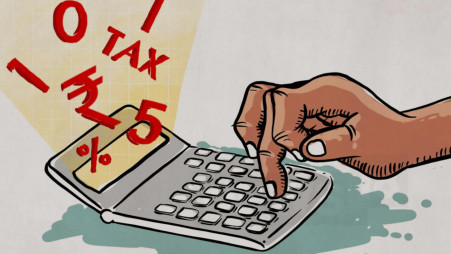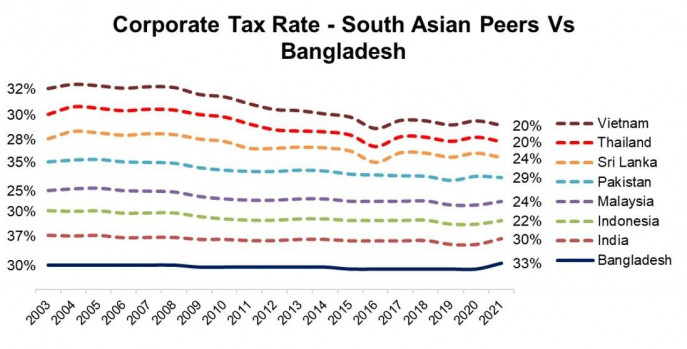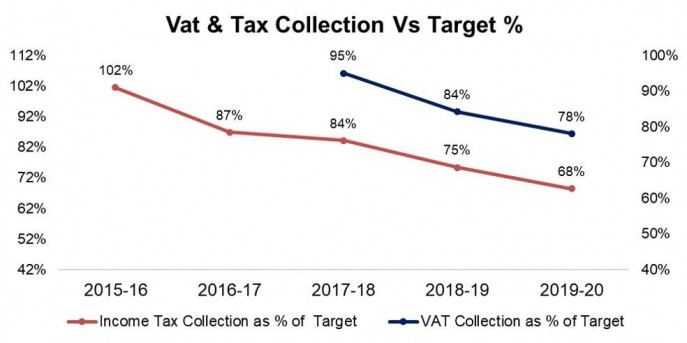Corporate tax: How does Bangladesh compare with peers?
Some economists argue in favour of reducing the corporate tax rate citing countries with lower corporate tax rates that have outperformed other countries in terms of economic growth

During the last two decades, corporate income tax (CIT) rate has increased from 30% in 2003 to 33 % in 2021. During the same time frame, while most regional peers of Bangladesh have lowered CIT, Bangladesh has clearly headed in the opposite direction.
Charging a high CIT to corporations is not without its limitations. Consequences of such tax policies lead to lower levels of after-tax income and retained earnings for companies. This means a higher tax rate reduces the residual income of a business, after tax, that it has available for retention or distribution (dividends).
Furthermore, fueled by a higher CIT rate, double taxation may have barred proliferation of local and foreign direct investment.
Currently, investors in Bangladesh are subject to a 10-15% tax on dividend earnings (non-resident individuals/companies tax rate 20%-30%). Local investors are subject to 10% tax on capital gains, compared to 15% tax for non-residential individuals and 5% for sponsors.
In practice, while all investors are subject to double taxation, a higher CIT rate only makes matters worse. Double taxation refers to the deduction of tax, first, from the pre-tax earnings of a corporation, and then, a second tax deduction, as personal income tax, on the investor's share of disbursed income.

According to the KPMG Taxation Report, corporate tax rate in Bangladesh for all unlisted public and private limited companies is 32.5%. However, corporate income tax rate (CIT) varies significantly based on the type of company.
For public companies listed on the exchange, the tax rate is 25%. While banks, insurance companies and other financial institutions are subject to 37.5% CIT (if listed) or 40% (if not listed).
Finally, the CIT rate for tobacco manufacturers and mobile network operators (MNO) is 45%, (40% for listed MNOs).
While the 33% CIT can be a burden for some corporations, the Finance Act 2019 and its latter amendments add to the woes of some companies.
According to the Section 16G of the Finance Act 2019, any listed company that retains more than 70% of its Net income after tax, has to pay 10% tax on the total amount being transferred to retained earnings.
Such a policy, however inadvertently, forces a dividend payout threshold for the companies, which can potentially take a toll on a company's strategic planning, operational performance and liquidity.
A more worrying trend can be observed in terms of tax collection. During the last 5 fiscal years, Tax Revenue as a percentage of Targeted Tax Collection has fallen drastically. FY 2015-2016, while the NBR was able to outperform the Tax collection targets by 2%, FY 2020 it was facing a shortfall of 32% (tax collection 68% of target). While a large chunk of it may be due to mismanagement in the collection of tax, a portion of it may be attributable to higher tax rates that have influenced offshore money-laundering.
While targets and estimates may often not match reality, a study conducted by NBR last year paints a worrying picture. According to NBR, out of 213,505 companies registered under RJSC, only 45,000 submitted tax returns. This implies that CIT compliance rate is 21%, i.e. – only 1 in 5 registered businesses pay tax.
Despite this, policy makers shy away from implementing major tax reforms, by cutting taxes for businesses.

Some economists argue in favour of reducing the corporate tax rate citing countries with lower corporate tax rates that have outperformed other countries in terms of economic growth.
During most of the last two decades, the average CIT rate in Asia has lingered at around 22%. Throughout this time period, two regional peers, Vietnam and Thailand, have held their CIT rates below the Asian average.
Therefore, their story of success macroeconomically is no coincidence. According to the World Bank, export of goods and services relative to nominal GDP throughout South Asia, since the early 2000s, has been an average of 20%. Vietnam and Thailand have outperformed all South Asian countries by averaging 78% and 67% respectively.
FDI to Thailand and Vietnam historically has been equivalent to as high as half of all of South Asia's FDIs. The results of this are well captured by the per capita GDP of these countries when compared to South Asian averages.
Besides capping the tax rates at 20%, Vietnam has implemented other business-friendly measures, such as the Preferential Tax Rates, which allows selected industries to enjoy CIT rates of 10% only.
In fact, Bangladesh, too, has similar policies. Currently, eight types of industrial companies, including - Jute, Textile, Knitwear, Poultry, Private Educational Institute, etc., are enjoying waived tax rates ranging between 3% to 15% based on various criteria.
Other tax incentives, such as the ones dedicated for businesses operating in EPZs, serve as a relief for qualifying industries. However, the CIT rate for the vast majority of industries is still 33%.
CIT is also not the only form of tax corporations are subject to. For firms for which CIT may not be directly applicable, a withholding tax is charged at a rate ranging between 0.3% to 15%. This withholding tax is charged on any of the 25 types of income of a firm listed by the NBR.
On the other hand, industries such as mobile phone operators are subject to 2% and 1% source tax on gross receipts respectively, given that gross receipts exceed BDT 5M.

There are further other indirect forms of taxes, such as VAT, tariffs, etc. In an ever so competitive business world, all these taxes are seen as a burden on local corporations.
For years, however, economists in Bangladesh have been divided over the benefits of lowering corporate taxes.
"Uzbekistan, Montenegro and Hungary have a single-digit corporate tax rate of 7.5 percent. Lower corporate tax rate is one of the main drivers of economic development for Ireland," said executive director of the Policy Research Institute Ahsan H Mansur in a 2018 interview.
"We have to be at par with similar countries. Compliance will rise and the tendency to hide incomes will reduce if the tax rate is reduced," he said back then, adding that corporate tax rate usually hovers between 20 percent to 25 percent in developed and emerging nations.
Golam Moazzem, research director of the Centre for Policy Dialogue, is however sceptical.
"Correlation between corporate tax rate cut and new investments does not strongly exist in Bangladesh. This is because of weakness in financial reporting," he said in a 2019 interview.
"It may not be the case that in every instance entrepreneurs will increase investment in case of corporate tax cut," he added.
Tax reforms, meanwhile, are easier said than done. For businesses to run efficiently, infrastructure, such as roads, logistics and power, is of paramount importance. These infrastructures are, by and large, funded by the government using tax revenue.
In conclusion, the corporate and the policy makers must find common ground – an optimal corporate tax rate. As we graduate from LDC, challenges await Bangladesh and its businesses in the years ahead. Paired with this, the threats of the pandemic have not passed as well. The road ahead is long and difficult, but in order to build a resilient and sustainable economy, Bangladesh needs to rethink its CIT rate. Such a move will likely encourage investments (FDI inflows), increase output (GDP) and boost our trade capabilities (export), opening doors of possibilities for us in the decades to come.


 Keep updated, follow The Business Standard's Google news channel
Keep updated, follow The Business Standard's Google news channel














